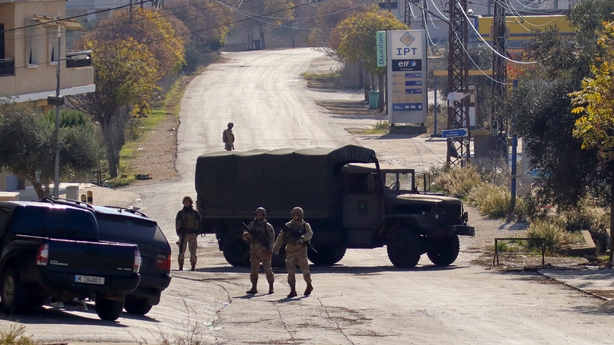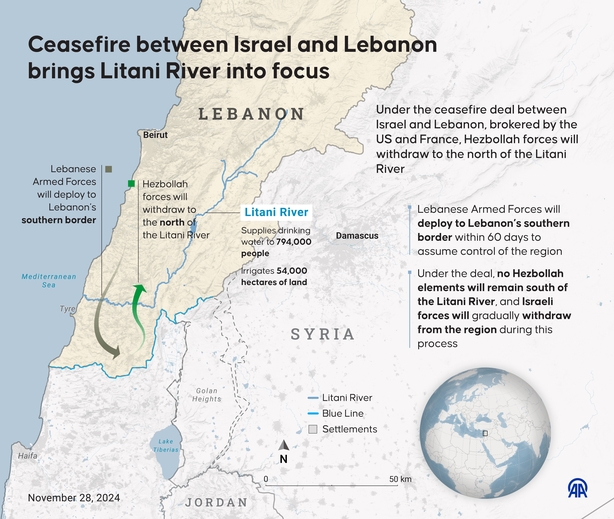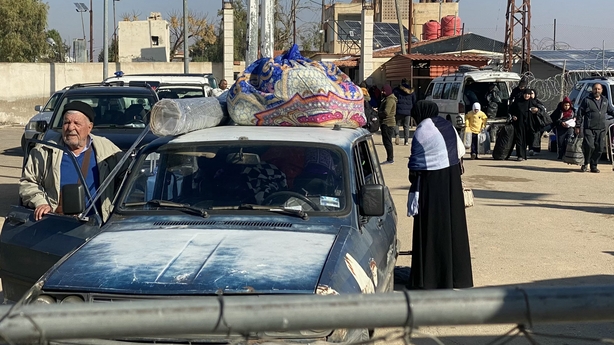The Lebanese army has said that Israel violated the ceasefire with Hezbollah several times yesterday and today while Israel said it conducted an air strike on a Hezbollah weapons facility today.
A ceasefire between Israel and the militant group Hezbollah took effect yesterday under a deal brokered by the US and France, intended to allow people in both countries to start returning to their homes in border areas impacted by 14 months of fighting.
Lebanon deployed troops and tanks across the country's south, where Hezbollah has long held sway, where only the army and UN peacekeepers are to maintain a presence under the terms of the ceasefire.
"A short while ago, terrorist activity was identified in a facility used by Hezbollah to store mid-range rockets in southern Lebanon," the Israeli military said, adding that "the threat was thwarted" by its air force.
Nazih Eid, mayor of Baysariyeh in south Lebanon, said a strike had hit an area of his town.
"They targeted a forested area not accessible to civilians," he said.
The Israeli and Lebanese militaries have both called on residents of frontline villages to avoid returning home immediately.
Two injured by Israeli fire in Lebanese border village - Lebanese media
Earlier, Israeli fire wounded two people in a border village, according to Lebanon's official National News Agency.
The Israeli army said that "over the past hour, several suspects were identified arriving with vehicles to a number of areas in southern Lebanon, breaching the conditions of the ceasefire".
The army "opened fire toward them", the statement said, adding that the Israeli military "remains in southern Lebanon and will actively enforce violations of the ceasefire agreement".
For the most part, however, the ceasefire appeared to be holding.
A Lebanese army source said its forces were "conducting patrols and setting up checkpoints" south of the Litani River without advancing into areas where Israeli forces were still present.
The Israeli army announced a nighttime curfew for areas south of the river, which are located near the border.

Hezbollah politician Hassan Fadlallah accused Israel of attacking people returning to their villages in south Lebanon.
Israeli tank fire hit six areas within the border strip this morning, striking Markaba, Wazzani and Kfarchouba, Khiyam, Taybe and the agricultural plains around Marjayoun, state media and Lebanese security sources said.
All of the areas lie within two kilometres of the Blue Line demarcating the border between Lebanon and Israel.
Lebanese families displaced from their homes near the southern border have tried to return to check on their properties.
But Israeli troops remain stationed within Lebanese territory in towns along the border and Reuters reporters heard surveillance drones flying over parts of southern Lebanon.
There was no immediate comment on the tank rounds from Iran-backed Hezbollah or Israel, who had been fighting for over a year in parallel with the Gaza war.

But Israel is still fighting Palestinian militant group Hamas in Gaza.
Under the ceasefire terms, Israeli forces can take up to 60 days to withdraw from southern Lebanon but neither side can launch offensive operations.
Israeli Prime Minister Benjamin Netanyahu said he had instructed the military not to allow residents back to villages near the border.
Lebanon's speaker of parliament Nabih Berri, the top interlocutor for Lebanon in negotiating the deal, had said that residents could return home.
Hezbollah said its fighters "remain fully equipped to deal with the aspirations and assaults of the Israeli enemy".
It said that its forces will monitor Israel's withdrawal from Lebanon "with their hands on the trigger".
The group has been weakened by casualties and the killing of its leader Sayyed Hassan Nasrallah and other commanders by Israel.

Lebanon to elect new president
Lebanon's parliament will meet on 9 January to elect a new president, seeking to end more than two years without a head of state, official media reported after the ceasefire began.
"Speaker Nabih Berri called a parliament session to elect a president of the republic on 9 January," the official National News Agency reported.
Lebanon has been without a president since Michel Aoun's term ended in October 2022, with neither of the two main blocs, the Iran-backed Hezbollah and its opponents - having the majority required to elect one, and unable to reach a consensus.
After the ceasefire between Israel and Hezbollah came into effect, Lebanese Prime Minister Najib Mikati said: "I hope this will be a new page for Lebanon, I hope the coming days will lead to the election of a president."
Mr Berri, who led ceasefire talks on behalf of ally Hezbollah, also called yesterday for the country to "quickly elect a president".
Hezbollah chief Naim Qassem said in a speech earlier this month that after the war, Hezbollah would "bring an effective contribution to the election of a president".
By convention, the presidency goes to a Maronite Christian, the premiership is reserved for a Sunni Muslim and the post of parliament speaker goes to a Shiite Muslim.
We need your consent to load this rte-player contentWe use rte-player to manage extra content that can set cookies on your device and collect data about your activity. Please review their details and accept them to load the content.Manage Preferences

